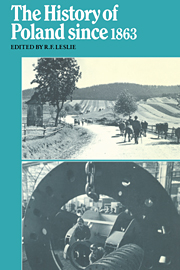Book contents
- Frontmatter
- Contents
- List of maps
- Preface to the paperback edition
- Abbreviations
- Map 1 Poland in the nineteenth century
- 1 Triloyalism and the national revival
- 2 Poland and the crisis of 1900–7
- 3 Poland on the eve of the First World War
- 4 The emergence of an independent Polish state
- 5 The breakdown of parliamentary government
- 6 Piłsudski in power, 1926–35
- 7 Poland without Piłsudski
- 8 Poland in defeat, September 1939–July 1941
- 9 The ill-fated alliance, August 1941–April 1943
- 10 The years of Tempest, May 1943–December 1944
- 11 Post-war Poland
- 12 The rise and ebb of stalinism
- 13 The October turning point
- 14 ‘The little stabilization’
- 15 The decline of Gomułka
- 16 Poland under Gierek
- 17 Polish society, 1945–75
- Epilogue: The rise and fall of Solidarity
- Notes
- Select bibliography
- Index
3 - Poland on the eve of the First World War
Published online by Cambridge University Press: 26 December 2009
- Frontmatter
- Contents
- List of maps
- Preface to the paperback edition
- Abbreviations
- Map 1 Poland in the nineteenth century
- 1 Triloyalism and the national revival
- 2 Poland and the crisis of 1900–7
- 3 Poland on the eve of the First World War
- 4 The emergence of an independent Polish state
- 5 The breakdown of parliamentary government
- 6 Piłsudski in power, 1926–35
- 7 Poland without Piłsudski
- 8 Poland in defeat, September 1939–July 1941
- 9 The ill-fated alliance, August 1941–April 1943
- 10 The years of Tempest, May 1943–December 1944
- 11 Post-war Poland
- 12 The rise and ebb of stalinism
- 13 The October turning point
- 14 ‘The little stabilization’
- 15 The decline of Gomułka
- 16 Poland under Gierek
- 17 Polish society, 1945–75
- Epilogue: The rise and fall of Solidarity
- Notes
- Select bibliography
- Index
Summary
The great crisis of 1905–7 passed away, but it could no longer be contended that the Polish Question had ceased to exist. In fact, events were to give it a greater significance. The crisis in Bosnia-Herzegovina of 1908 left the Poles in no doubt that sooner or later the three great powers of Central and Eastern Europe would be involved in war and that in consequence one side or the other would be required to produce some solution to the problem of their existence. Poland did not exist as a country, because it was merely a frontier area on the periphery of three great empires. It was therefore clearly assigned to be a battlefield when the great conflict came. Since Poland did not herself possess an army to fight for her independence it followed that the Poles speculated upon which of the contending alliance groups they ought to place their hopes. No clearly defined solution could be found. The position of Germany was plain. The Germans had no place for the Poles in a Europe of their making. For practical purposes the choice lay between Austria–Hungary and Russia. The Polish inhabitants of Prussian Poland saw no future for themselves in a German state and were attracted to Russia. The landed proprietors of eastern Galicia, harassed by the Austro-Hungarian government's disposition to support the Ukrainians as a means of putting pressure upon the Poles, thought that they would fare better in a conservative Russian state.
- Type
- Chapter
- Information
- The History of Poland Since 1863 , pp. 97 - 111Publisher: Cambridge University PressPrint publication year: 1980



